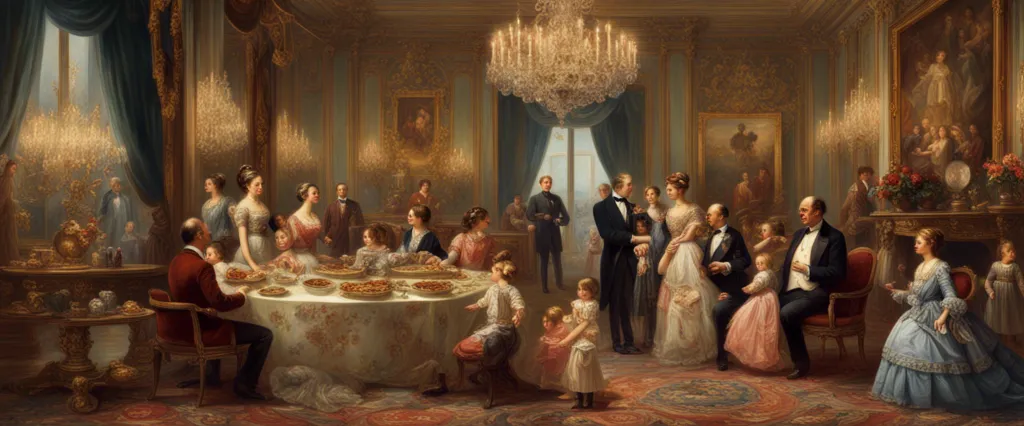The Family Romanov: A Tale of Tragedy and Change
Chapter 1 What's The Family Romanov by Candace Fleming
"The Family Romanov: Murder, Rebellion, and the Fall of Imperial Russia" by Candace Fleming is a historical account that delves into the tumultuous life of the Romanov family, the last imperial dynasty of Russia. Through detailed research and vivid storytelling, Fleming explores the personal and political factors leading to their downfall in 1918. The book combines historical narrative with biographical elements, focusing on significant figures like Tsar Nicholas II, his wife Alexandra, and their children. It highlights the contrasts between the opulent lifestyle of the Romanovs and the growing unrest among the Russian populace, ultimately culminating in the revolutionary fervor that led to the family's execution. The narrative is enriched with photographs, documents, and perspectives from contemporaries, making it a compelling read for those interested in Russian history and the impact of monarchy on society.
Chapter 2 The Family Romanov by Candace Fleming Summary
"The Family Romanov: Murder, Rebellion, and the Fall of Imperial Russia" by Candace Fleming is a historical account that explores the final years of the Romanov dynasty, focusing on the lives of Tsar Nicholas II, his wife Alexandra, and their five children. The book provides a detailed portrayal of their opulent yet isolated life in the Imperial palace, juxtaposed with the growing discontent among the Russian people due to widespread poverty, political corruption, and social injustice.
Fleming examines the factors that contributed to the family's downfall, including Nicholas II's ineffectual leadership, the influence of Grigori Rasputin, and the rising tide of revolutionary sentiment in Russia. The narrative delves into the personal struggles of the Romanov family as they grapple with their declining power and the impact of World War I on the nation.
As the situation in Russia becomes increasingly dire, the story culminates in the brutal events of 1918 when the family was executed by Bolshevik forces. The book not only recounts these historical events but also humanizes the Romanovs, revealing their bonds, hopes, and fears in the face of impending tragedy.
Fleming's work combines rich historical detail, personal anecdotes, and a compassionate lens to present a nuanced portrayal of a royal family caught in the turmoil of revolution, making it both an informative and engaging read for those interested in Russian history.
Chapter 3 The Family Romanov Author
Candace Fleming is an acclaimed American author known for her works of children's and young adult literature, particularly in the realms of nonfiction and historical fiction. She released The Family Romanov: Murder, Rebellion, and the Fall of Imperial Russia in 2014.
Fleming has written several other notable books, including:
1. The Great and Only Barnum: The Tremendous, Stupendous Life of Showman P.T. Barnum (2009)
2. Ben Franklin's Almanac: Being a True Account of the Good Gentleman's Life (2006)
3. The Nightingale: The Incredible Story of the Youngest Woman to Fly the Atlantic (2009)
4. Our Leaders: A History of the American Presidency (2014)
5. Honeybee: The Busy Life of Apis Mellifera (2020)
In terms of critical acclaim and recognition, The Family Romanov stands out. It received a Robert F. Sibert Honor and was widely praised for its engaging narrative and thorough research. This book, often highlighted for its compelling storytelling and rich historical detail, is considered one of her best works.
If you're looking for a definitive edition of The Family Romanov, the hardcover edition released in 2014 is often regarded as the best for its durability and quality. However, many readers also appreciate the paperback version and any updated editions that might include new insights or illustrations.
Overall, Candace Fleming's ability to blend facts with powerful narratives has made her a prominent figure in contemporary children's literature.
the-family-romanov
Chapter 4 The Family Romanov Meaning & Theme
The Family Romanov Meaning
"The Family Romanov: Murder, Rebellion, and the Fall of Imperial Russia" by Candace Fleming is a non-fiction book that explores the final years of the Romanov dynasty, focusing on the tragic story of Tsar Nicholas II and his family. The book delves into themes of power, privilege, and the consequences of absolute monarchy, providing a detailed account of the political and social turmoil that led to the Russian Revolution and the eventual downfall of the imperial family.
Key meanings and themes in the book include:
1. Historical Context: The book presents a vivid picture of early 20th-century Russia, emphasizing the stark contrasts between the opulence of the Romanovs and the struggles of the common people. It illustrates how the disconnect between the ruling class and the populace contributed to resentment and rebellion.
2. Tragedy and Humanization: Fleming humanizes the Romanov family, portraying them not only as rulers but as individuals with personal struggles, relationships, and vulnerabilities. This approach invites readers to empathize with them, even amid their privilege.
3. Consequences of Power: The narrative explores the perils of unchecked power and the fragility of monarchy. The Romanovs' inability to adapt to the changing political landscape ultimately led to their downfall, highlighting the dangers of ignoring the needs and voices of the people.
4. Rebellion and Revolution: The book illustrates the forces of rebellion that culminated in the revolution, demonstrating how widespread discontent can lead to significant societal change. It reflects on the idea that political structures must evolve to reflect the will of the people.
5. Legacy: The fate of the Romanov family raises questions about memory, history, and how societies come to terms with their past. The narrative invites readers to consider the implications of remembering and forgetting in the context of historical events.
Overall, "The Family Romanov" serves as both an engaging historical account and a cautionary tale about the complexities of power and the human experience.
The Family Romanov Theme
"The Family Romanov: Murder, Rebellion, and the Fall of Imperial Russia" by Candace Fleming explores several key themes:
1. The Illusion of Power: The Romanovs believed in their divine right to rule, yet their absolute power was challenged by social upheaval and revolution. The theme highlights how those in positions of power can become detached from reality and the lives of the people they govern.
2. The Consequences of Privilege: The stark contrast between the extravagant lifestyles of the Romanov family and the suffering of the Russian populace underscores the theme of privilege. It examines how wealth and luxury can blind individuals to the struggles of those less fortunate, leading to societal tensions.
3. Revolution and Change: The book details the rise of revolutionary movements and the eventual overthrow of the Romanov dynasty, emphasizing how collective action and a desire for change can impact history. It showcases the complexity of revolution, including motivations, ideologies, and the price paid by individuals.
4. Family and Loyalty: The bond between the Romanov family members is portrayed against the backdrop of political turmoil. Their loyalty to one another highlights the personal dimensions of historical events, even in the face of impending tragedy.
5. Historical Legacy: The impact of the Romanovs' reign and their downfall on Russian history is a recurring theme. It prompts readers to consider how history is remembered, who gets to tell the story, and the implications of legacy for future generations.
Through these themes, Fleming invites readers to reflect on the complexities of power, family, and the human capacity for both cruelty and compassion.
the-family-romanov
Chapter 5 Quotes of The Family Romanov
The Family Romanov quotes as follows:
Here are ten notable quotes from "The Family Romanov: Murder, Rebellion, and the Fall of Imperial Russia" by Candace Fleming:
1. "They were the last of their kind, a dynasty that had ruled Russia for three hundred years."
2. "The Romanovs were not just a royal family; they were a symbol of a nation."
3. "As they sipped their tea, a shadow loomed over their lives and the lives of their subjects."
4. "The people were hungry for change, their anger boiling just beneath the surface."
5. "History is shaped not by a single person, but by the collective actions of many."
6. "To the Romanovs, Russia was a great empire, but to the peasants, it was a land of suffering."
7. "A monarchy that had once seemed invulnerable was crumbling before their eyes."
8. "In the face of rebellion, the family clung to their ideals and each other."
9. "The end of the Romanov dynasty marked the beginning of a new era for Russia."
10. "The ghosts of the Romanovs linger in the hearts of those who remember."
These quotes reflect the themes of the book, including the complex dynamics of power, family, and the transformative events of Russian history. If you want specific passages or detailed interpretations, I can help with that as well!
Chapter 6 Similar Books Like The Family Romanov
Certainly! Here’s a list of five captivating books that delve into themes of history, family dynamics, and societal upheaval, resonating with the atmosphere of The Family Romanov but steering clear of it directly:
1. "The House of the Dead" by Fyodor Dostoevsky
This semi-autobiographical novel offers a haunting glimpse into life in a Siberian prison camp, where Dostoevsky himself was confined. Through the lens of the protagonist's experiences, the book explores themes of injustice, human resilience, and the impact of government on individual lives. The vivid character portrayals and gripping narrative illuminate the darker aspects of Russian society.
2. "Anna Karenina" by Leo Tolstoy
A classic of Russian literature, Anna Karenina intertwines the personal struggles of its titular character with a broader commentary on 19th-century Russian society, particularly the institution of family and the constraints of societal expectations. Tolstoy's exploration of love, fidelity, and morality makes this novel a profound reflection on the human condition.
3. "Blood Moon: An American Epic of War and Splendor in the Cherokee Nation" by John P. McCoy
This historical narrative uncovers the rich yet tumultuous history of the Cherokee Nation during the 19th century, touching on themes of identity, resilience, and community amidst political strife and cultural displacement. McCoy's storytelling brings to life the family ties, leadership challenges, and the fight for survival against overwhelming odds.
4. "The Other Side of the Sky: A Memoir" by Farah Ahmedi
Through the lens of her own experiences as a refugee from Afghanistan, Ahmedi explores themes of loss, survival, and the redefinition of family in the face of trauma. Her powerful storytelling and honest reflections on hope and resilience resonate deeply, making this memoir an inspiring testament to the strength of the human spirit.
5. "The Immortal Life of Henrietta Lacks" by Rebecca Skloot
This incredible nonfiction narrative weaves together the story of Henrietta Lacks, whose cells were taken without her knowledge and became a cornerstone of modern medical research. Skloot’s account not only highlights ethical issues in science and medicine but also delves into Lacks' family dynamics, their struggles for recognition, and the intersection of race and healthcare in America.
These books provide rich historical contexts and compelling narratives centered around family, society, and the human experience, perfect for readers who enjoyed The Family Romanov. Happy reading!
the-family-romanov
Book https://www.bookey.app/book/the-family-romanov
Author https://www.bookey.app/book/the-family-romanov#Author
Quotes https://www.bookey.app/book/the-family-romanov/quote
The Other Side of the River https://www.bookey.app/book/the-other-side-of-the-river
Youtube https://www.youtube.com/watch?v=9ewvPqadeqw
Amazon https://www.amazon.com/Family-Romanov-Rebellion-Outstanding-Nonfiction/dp/0375867821
Goodreads https://www.goodreads.com/book/show/18691014-the-family-romanov


